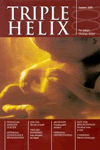This is an extreme book. The authors, one of whom worked as a doctor in psychiatric hospitals for four years before entering the Anglican ministry, believe that self pity is at the root of all 'mental illness'. Breakdowns are considered good because the patient comes to a moral realisation that they are responsible for their illness. The authors argue that schizophrenia and depression are not mental illnesses at all, 'schizophrenia is almost entirely due to bad (ie self-pitying) behaviour'. This book reminds me of Thomas Szasz' famous book, The Myth of Mental Illness, where he too argues that all non-organically proven conditions like schizophrenia are not mental illnesses. According to Szasz, it is wrong to exculpate criminal behaviour on the basis of 'non-illnesses' like schizophrenia. Likewise, Law and Bowden state that schizophrenic patients are 'crooked' and schizophrenia is not considered to be an organic disease. 'Environmental and genetic predispositions do not control our activity - they can always be over-ridden'.
This is a simplistic, albeit imaginative, attempt to classify all mental disorders under one large explanatory theory. They are all here - anorexia nervosa, alcoholism, multiple personality disorder, narcolepsy, personality disorder, mania, depression, schizophrenia.
According to Law and Bowden 'True Biblical Counselling' is made up of three propositions:
- All problems that can be dealt with and solved in counselling sessions are always due to the pride, self-centredness and self-pity of the counsellee.
- Medical (ie organic) illnesses do not make us sin.
- Where there is said to be a medical problem, whether it is true or not, or where they have been classified as 'mentally ill', self-pitying counsellees invariably use this to excuse their behaviour.
The authors advocate 'true biblical counselling' for case examples such as, 'Anne's moody husband', 'Bill has a problem with his new manager', 'Fred's anger'. In treating Fred's anger and self-pity, there is useful biblical material in the approach taken by the authors when they go through 'The 5R's: Responsibility, Repentance, Reconciliation, Restitution, and Re-building on Christ'.
The problem arises when the authors use the same approach for schizophrenia and depression, neither of which they consider to be mental illnesses. They cite a Weekend Telegraph columnist, Cressida Connolly, 'as an independent confirmation of our basic argument which is that depression, irrespective of medical aspects originates within the depressives themselves'. Theirs is a rigid view of depression.
In the case of schizophrenia, the authors write that symptoms appear in early adulthood because of the 'high level of achievement expected of young people'. This is where the book is very difficult to get along with, because of the lack of genuine evidence. Moreover the evidence which is cited comes from William Glasser's book Reality Therapy. Glasser quotes his teacher Dr GL Harrington, who in 1962 had taken over the care of 206 schizophrenic in-patients and managed to discharge many of them by increasing their freedom to take more responsibility for their activities, so gaining self-worth. The philosophy was one where 'mental illness was not accepted'. To reject all biological theories of schizophrenia on the basis of this one non-randomised un-controlled trial is unscientific.
The authors have some useful advice on, 'How the Christian should deal with life's problems', 'How the Christian should handle personal problems', 'Living the full Christian life'. But, while the authors' wide use of scripture seems impressive, it is not matched by reasoned understanding of mental health issues.
Reviewed by:
Dominic Beer
Consultant Psychiatrist in London































